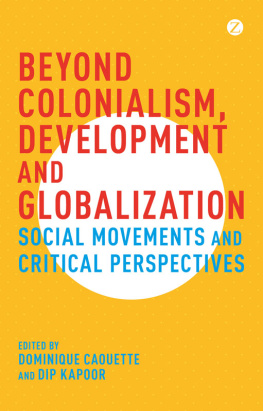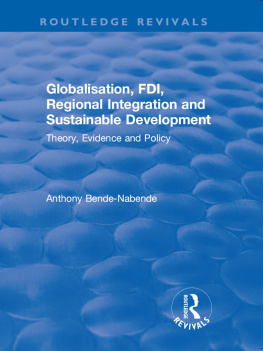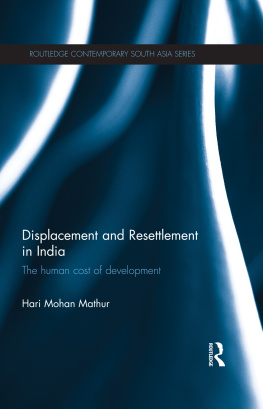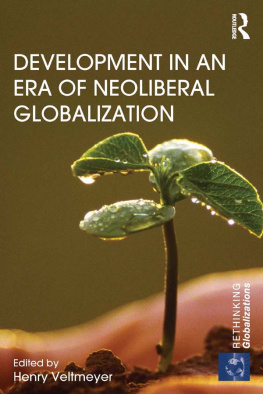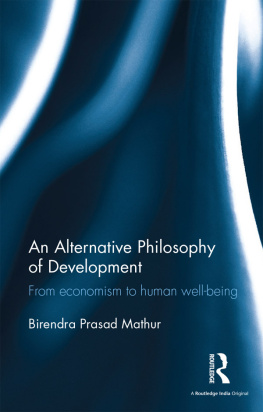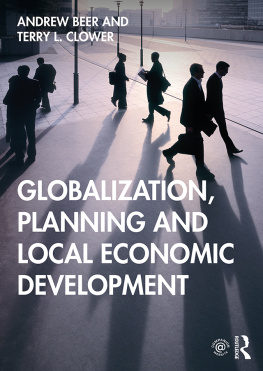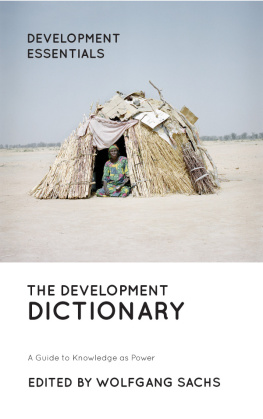
About the editors
Dominique Caouette is an Associate Professor with the Department of Political Science and Director of the East Asian Studies Centre at Universit de Montral, Canada, where he teaches international relations and Southeast Asian politics. Before joining the university, he worked for five years with Inter Pares, a global social justice organization, where he was part of the Asia Team.
Dip Kapoor is Professor, International Education at the University of Alberta, Canada, and Research Associate at the Centre for Research and Development Solidarity (CRDS), an Adivasi-Dalit rural organization in India. His previous books include NGOization: Complicity, Contradictions and Prospects (Zed Books 2013).
Beyond Colonialism,
Development and
Globalization
Social Movements and
Critical Perspectives
Edited by
Dominique Caouette and Dip Kapoor

Beyond Colonialism, Development and Globalization was first published in 2016 by Zed Books Ltd, The Foundry, 17 Oval Way, London SE11 5RR, UK.
www.zedbooks.co.uk
Editorial copyright Dominique Caouette and Dip Kapoor 2016
Copyright in this collection Zed Books 2016
The rights of Dominique Caouette and Dip Kapoor to be identified as the editors of this work have been asserted by them in accordance with the Copyright, Designs and Patents Act, 1988.
Typeset in Sabon by Saxon Graphics Ltd, Derby Index by Indexing Specialists (UK) Ltd Cover designed by roguefour.co.uk
All rights reserved. No part of this publication may be reproduced, stored in a retrieval system or transmitted in any form or by any means, electronic, mechanical, photocopying or otherwise, without the prior permission of Zed Books Ltd.
A catalogue record for this book is available from the British Library.
ISBN 978-1-78360-585-9 hb
ISBN 978-1-78360-584-2 pb
ISBN 978-1-78360-586-6 pdf
ISBN 978-1-78360-587-3 epub
ISBN 978-1-78360-588-0 mobi
This collection is dedicated to Peter Gillespie, fellow traveller, friend and colleague, whose life embodied a genuine commitment to a praxis rooted in critical thinking and collective action that dared to question the comfort of certainties and dogmas, with humility, authenticity and a generosity of spirit.
Acknowledgements
As with many collective projects, this one grew out of conversations around how social movements were challenging the way international organizations, non-governmental organizations and governments were constructing and defining development projects and programmes within capital. Oftentimes wrapped in the mantra of liberal rights and norms and well-meaning intentionality, such interventions were conceived without attending to local histories, economic disparities and politics, let alone culture and reflexivity and their links to an increasingly globalizing capitalism. At the same time, we were witnessing an expanding theoretical literature criticizing and questioning the development project and its institutional field. Marked by a rich and creative use of adjectives and evocative imagery (among others, post-development, alternative development, aprs development, human development, radical development, beyond development, development impasse) and emerging theoretical bricolage (postmodernism, postcolonialism, subaltern perspective, social constructivism, etc.), a momentum was building within academic circles, it seemed, to open and explode new frontiers. Yet, such effervescence also seemed detached from social struggles on the ground and the very specific contexts and localities where our research and activism was placed.
From these and other related conversations and shared concerns, we decided to write to colleagues whom we thought would be interested in exploring these ideas and attempt to bridge this apparent disconnect. It has turned out to be a fruitful endeavour, albeit a lengthy one, that will now, we hope, continue to stimulate critiques and praxis in various contexts of struggle and critical academic scholarship considering social movements, colonialism, development and globalization or capitalism and related Euro-American global knowledge projects.
This collection was made possible through individual grants from the Canadian Social Sciences and Humanities Research Council. We would like to thank all our contributors for their effort and their fidelity in staying with this protracted process, and Allison Crump, who has patiently accompanied us through multiple revisions and edited with rigour and a wonderful sense of humour. Dominique would also like to thank Timoth Nothias and Anne-Ccile Gallet, who helped synthesize and translate earlier drafts, and in particular the ABC gang (Arca, Bing and Claude), who helped him keep his sanity and health by pulling him away from his office.
| Beyond Colonialism, Development and Globalization |
Social Movements and Critical Perspectives |
Dominique Caouette and Dip Kapoor |
Introduction
), captured the imagination and energy of several generations of individuals and institutions dedicated to the project. The international development industry was not just the domain (chasse-garde) of the West; the Communist bloc also promoted development aid programmes. Although capitalist and socialist-driven aid programmes differed widely in terms of the role of the state and commitments to equality, the notion of political participation and the ultimate goals of development were infused with ideas embedded in the philosophical liberalism of the Enlightenment and of modernity, science and industrial modernization.
Although the origins of the ideology of unlimited scientific progress and its intrinsically positivist character go back as far as Greek Antiquity, it is with the onset of the Enlightenment period in the eighteenth and nineteenth centuries that the doctrine of social development took root. As development became institutionalized, it started to embody various corpuses of knowledge, each with its own underlying disciplinary effects, including productivity, homogeneity and division of labour. Such ideas were not detached from the daily realities of the time, as newly consolidated Western European nation states were experiencing social tensions and new problems with increasing industrialization and urbanization. Liberal philosophers and intellectuals, who advised policymakers and the emerging bourgeois regimes, worked to avoid or stabilize social disorder. This period was thus marked by the maintenance of and concern for order and progress. This prompted the construction of public institutions and agencies capable of regulating social practices, ranging from hygiene to transportation to market transactions, in order to move towards modernity in the eighteenth century. Development gradually became the end rather than the means of government intervention, because it embodied the ideas of progress and modernity. Anything that fell outside this path was considered as disorderly, archaic and backwards and eventually became linked to underdevelopment.
). Acting as a justification for the ongoing process of colonization, a universalizing language of trusteeship of developed and modern nations towards their colonies started to emerge. With development becoming an intrinsic part of the civilizing mission of the West, colonization acquired an appearance of legitimacy for its important and much more real motivations, namely the extraction of resources and wealth from the colonies. The strength of development as the embodiment of modernity and progress intensified during the second half of the nineteenth century and the race for colonies. Colonial administrations, despite their intra-imperial competition, promoted the European model as the natural way (
Next page
